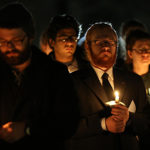WASHINGTON (ABP) — Religious anti-torture groups said the Aug. 24 release of a partially declassified 2004 CIA report on treatment of terrorism suspects justified their critique of Bush administration policies on detainee treatment.
But they also said the decision by the Justice Department to appoint a special prosecutor to probe alleged CIA interrogation abuses doesn’t go far enough in pursuing those who authorized and oversaw harsh treatment of terrorism suspects in United States custody.
“The [CIA] inspector general’s report adds to the condemning facts already known about detainee abuse in U.S. prisons and facilities by describing threats of imminent death made against detainees and the staging of mock executions in order to coerce confessions or gain intelligence,” said a statement from Evangelicals for Human Rights reacting to the report’s release.
“Its description of cruel, inhuman, and degrading treatment employed by CIA interrogators in the years following the horrible attacks of 9/11 clearly shows torture,” the statement continued. “This is a moral failure by our nation as we have disregarded the tradition of George Washington and Abraham Lincoln of treating detainees, in all manners of war, with fairness and even respect.”
The partially declassified report — which the Obama administration was forced to release in response to an American Civil Liberties Union lawsuit — was written by the CIA inspector general’s office in May 2004 and detailed how U.S. officials and contractors treated terrorism suspects in the frantic intelligence-gathering period following the Sept. 11, 2001, terrorist attacks.
The report revealed several examples of tactics that went beyond even the harsh techniques for which Bush administration lawyers had provided controversial legal justification. They included:
— Telling detainees that their family members would be hurt or killed unless they complied with interrogators.
— Staging mock executions to convince suspects that they could be killed unless they provided requested information to interrogators.
— Excessive use of the waterboarding tactic, where the sensation of drowning is simulated. One high-value suspect — al Qaeda operative Khalid Sheikh Mohammed — was waterboarded a total of 183 times, according to the report.
Sign up for our weekly edition and get all our headlines in your inbox on Thursdays
— Menacing one detainee with a power drill while he stood naked and hooded.
The same day that the report was released, Attorney General Eric Holder announced he had appointed longtime federal prosecutor John Durham to begin a preliminary investigation of several alleged CIA abuses of detainees or terrorism suspect, including some that ended in death.
Also on Aug. 24, the White House announced an elite new terrorism interrogation unit, comprised of personnel from several agencies and housed at the FBI. And the Justice Department’s special task force on interrogation policies — formed pursuant to a group of Obama executive orders from January that also undid Bush administration policy on many terrorism-detainee practices — announced its recommendations to the White House.
The National Religious Campaign Against Torture released a statement that said the CIA report detailed “horrific abuse” and calling for a more comprehensive inquiry into possible torture than Holder’s investigation.
“Our country will not end this sordid chapter of American history until we understand the full nature of U.S.-sponsored torture and put safeguards in place to make sure that U.S.-sponsored torture never happens again,” the statement said. “It is our responsibility to assure that future generations of Americans grow up in a country that does not torture.”
The CIA report was one of the documents that then-Vice President Dick Cheney cited as confirming that his administration’s interrogation tactics had produced information that prevented future terrorist attacks.
The report said that the overall CIA interrogation program had produced some valuable information and that “detainee reporting has become a crucial pillar of U.S. counterterrorism efforts.” However, the inspectors added, whether the controversial interrogation tactics or more traditional ones produced that information “is a more subjective process.”
Evangelicals for Human Rights — of which Baptist ethicist David Gushee is the director — also renewed its previous calls for a more comprehensive inquiry “so that the world will again see the United States as a nation that lives up to the highest calling of any nation, and all faiths, the call to truthfulness and justice for all people.”
The statement concluded: “Torture is always morally wrong, without exceptions, even if it produces information.”
–Robert Marus is managing editor and Washington bureau chief for Associated Baptist Press.
Previous ABP stories:
Religious leaders call for inquiry into U.S. use of torture (6/16)















We seek to connect God’s story and God’s people around the world. To learn more about God’s story, click here.
Send comments and feedback to Eric Black, our editor. For comments to be published, please specify “letter to the editor.” Maximum length for publication is 300 words.